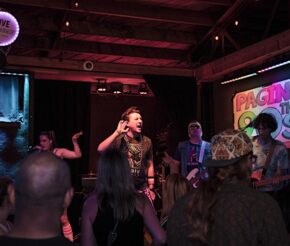- Advertise
-
Subscribe
Drug Testing Kits: Just Test It

Globally, recreational drugs claim an estimated 750,000 lives per year.
For the longest time, governments have responded to stats like these by insisting that drugs are inherently deadly and anyone who takes them should be punished.
But is this really helping? The simple answer is no.
The dangers of party drugs are well-known, but people keep using them because people like using them – that’s been the case for decades.
Horror stories and legal punishments might put some ravers off, but for the vast majority they’re ineffective at best and dangerous at worst, creating a stigma around drugs that leaves users uninformed about what they’re taking and how they might react.
That’s where drug testing kits comes in.
Drug testing kits is yet to become common practice, which is the whole problem
In 2009, the Welsh Emerging Drugs and Identification of Novel Substances Project (WEDINOS) noticed an increase in hospital admissions involving patients reacting badly to substances they didn’t know they’d taken.

This wasn’t a case of spiking. By driving drug culture deeper underground, a zero-tolerance approach had the knock-on effect of driving transparency about drugs underground too. This allowed dealers to get away with cutting pure
drugs with cheaper stuff because customers weren’t able to check what they were taking.
Globally, there’s still no government-run testing programme that is 100% mandatory at nightclubs and festivals in any country, despite the huge pressure from partygoers to get lawmakers to start protecting them rather than punishing them.
Globally, there’s still no government-run testing programme that is 100% mandatory at nightclubs and festivals in any country, despite the huge pressure from partygoers to get lawmakers to start protecting them rather than punishing them.
Drug testing – or a lack thereof – is a topic that impacts everyone. Party drugs cut with cheaper, deadlier substances crop up in all sorts of communities around the world. From the son of a Greek billionaire who died from taking a mix of cocaine, heroin, and fentanyl, to a seventeen-year-old girl from Oldham who died of a suspected overdose at Leeds Festival (where pills three times stronger than the standard adult dose were in circulation).
Plenty of festivals across Europe have taken matters into their own hands by introducing drug tents where people can get their gear tested free of charge and judgment.
But it’s yet to become a common practice, which is the whole problem.
Even when there is help at hand, users often don’t accept it for fear of repercussions
So long as people think of drug-use as a hushed-up habit, they’re likely to think of punishments and strict consequences when they contemplate asking for advice on a drug-related issue.
In spite of the fact that nightclubs have also gotten behind the drug testing boom – offering free cocaine and MDMA screening facilities in venues across Europe – even when there is help at hand, users often don’t accept it for fear of the repercussions.

If people continue to associate their weekend habits with secrecy and punishment, they’re going to continue to get taken advantage of by dealers who profit from ripping off the uninformed among us.
But we can be better informed by taking matters into our own hands and testing our gear if we’re going to use it. So why don’t we?
Organisations have sprung into action to make drug testing accessible
Sure, governments may have made safe recreational drug-use someone else’s problem, but that doesn’t mean there aren’t plenty of organisations making it their mission to offer solutions.

For DanceSafe, it’s as easy as visiting their online shop and purchasing a testing kit and fentanyl strips designed for the type of drug you were planning on taking (which might not end up being what you thought it was).

Home and venue testing severely decreases the risks associated with recreational drug-use
Destigmatising drug-use on a societal level isn’t as simple as writing a few articles about the benefits of testing-kits and promoting them to anyone willing to listen.
So long as drugs aren’t talked about openly in government health advice and the mainstream media, users have to seek out their own advice if they want to do them more safely. That’s pretty counterproductive for attracting partygoers who want to have a good time tonight and think about the consequences tomorrow.
Even though they’re not talked about or promoted widely enough yet, there’s still strong evidence that home and venue testing severely decreases the risks associated with recreational drug-use, period.
A 2018 study at a festival in Cambridge reported a 95% drop in hospital admissions after they introduced onsite testing measures – that’s certainly not to be sniffed at (if you’ll pardon the pun).

Beating the stigma is about asking ourselves why we’re not testing
Ultimately, we don’t care what you dabble in. We just care that you test it first.
Drug kits save lives and they’re growing more and more accessible every day.
If you’re a recreational drug user who doesn’t test, you can help beat the stigma by asking yourself one question: why not?
If you’re looking for help with drug-related issues, you can find useful links to advice and support pages here.





